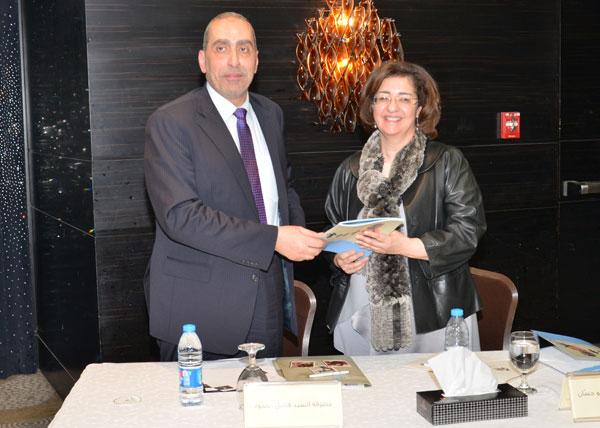You are here
Child helplines need supervision, clearer governing policies — study
By Laila Azzeh - Feb 08,2016 - Last updated at Feb 08,2016

Social Development Minister Reem Abu Hassan receives a study on the performance of helplines in Jordan from National Council for Family Affairs Secretary General Fadel Hmoud during a ceremony in Amman on Monday (Photo courtesy of NCFA)
AMMAN — Telephone hotlines providing help for children and families in the Kingdom lack a supervisory authority, accreditation programmes for staff, and clear governing policies, according to recently announced results of a study of the performance of helplines in Jordan.
Carried out by the National Council for Family Affairs (NCFA) in cooperation with UNICEF between January and May 2015, the study established that the Kingdom has "no policies or procedures that regulate the work of child helplines, nor is there any other party that supervises and monitors the operation of the helplines".
The study covered 15 hotlines for children and families, four of which are affiliated with the government, including an emergency line at the Family Protection Department and a "protection" hotline for the Education Ministry.
"The rest of the helplines are operated by non-governmental organisations," said the survey, which showed that funding is "critical" in the sustainability of the provision of helpline services.
At a press conference held Monday to announce the outcomes of the survey, experts underlined the importance of child helpline services as a protection and support mechanism.
"The family and child helplines are deemed essential tools of response in cases of emergency. They help refer the beneficiaries to the concerned bodies and offer holistic services that can solve many issues," said NCFA Secretary General Fadel Hmoud.
While the survey said child helplines are a "new experience" in Jordan, Social Development Minister Reem Abu Hassan said there are more hotlines today that work effectively to rescue individuals.
"We were afraid in the past of the inability to sustain hotlines if foreign funding stopped, but not anymore. We can now continue these services regardless of external support," said the minister.
According to the study, around 47 per cent the examined lines depend on external funding, while only 20 per cent are funded locally and 33 per cent by local and foreign funding.
Abu Hassan highlighted the need for efficient helplines to be free-of-charge, operated by cadres trained in children's rights and to have numbers that can be easily memorised.
The survey showed that only 13 per cent of the hotlines are totally free of charge from any network, while the rest are free via certain networks only.
It also maintained that most of the lines did not engage their target groups effectively to help define activities or evaluate the provided services.
In addition, several limitations were registered, including the absence of a supervisory entity that regulates the work of the hotlines, poor awareness of their availability and duties, and the lack of any accreditation programmes for the helplines' staff.
A total of 53 per cent of the helplines in Jordan operate around-the-clock, the report said.
The recommendations of the study included establishing an entity to supervise helplines, developing policies governing these services and providing training to the staff.
Speaking at the press conference, Ettie Higgins, deputy representative of UNICEF, noted that Jordan has made "great" advances in the protection of women and children, especially in developing various standards and frameworks for family protection that are gender-sensitive and child-friendly.
She stressed the need for establishing national standards that all should abide by when delivering services to those in need, adding that helplines should exist in every country as a channel for support and education on rights.
Related Articles
AMMAN – Coverage of children’s issues by local media tends to be “superficial”, with “many” journalists lacking the legal understanding of c
AMMAN — The National Council for Family Affairs (NCFA) last week held a series of meetings with stakeholders to update the National Framewor
AMMAN — Secretary-General of the National Council for Family Affairs (NCFA) Mohammad Miqdadi said that he is hopeful that a recent chi
















